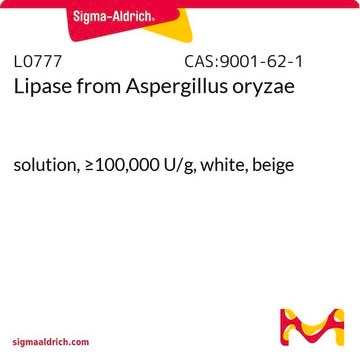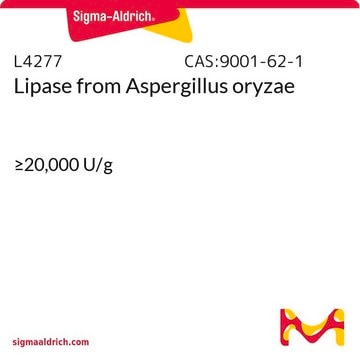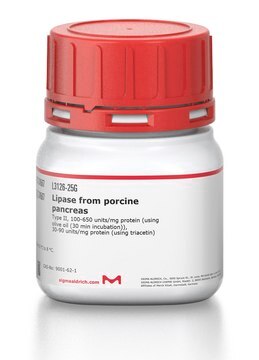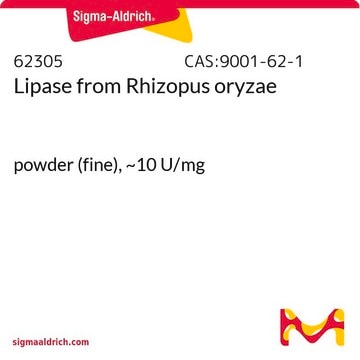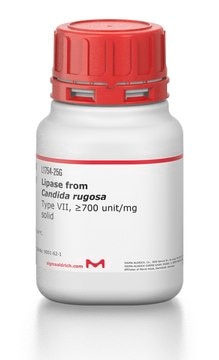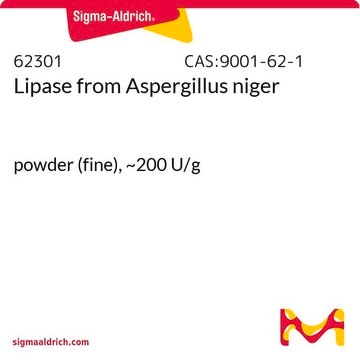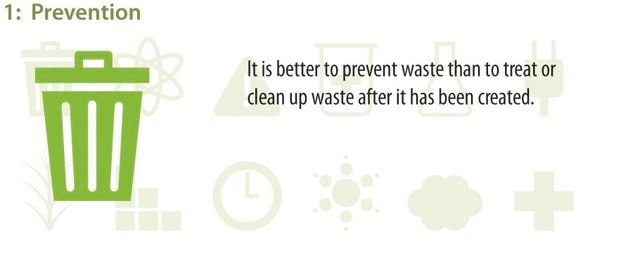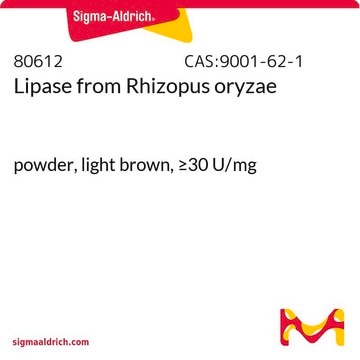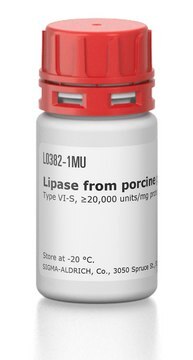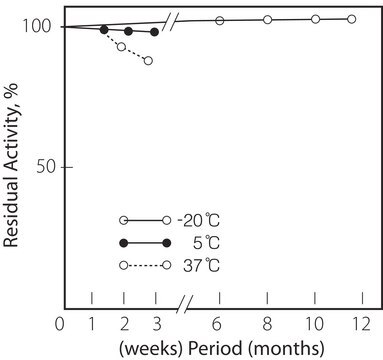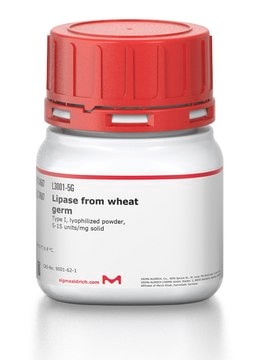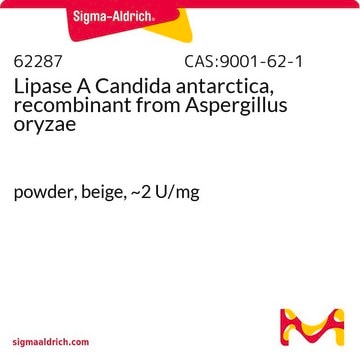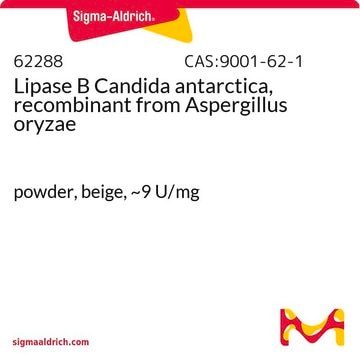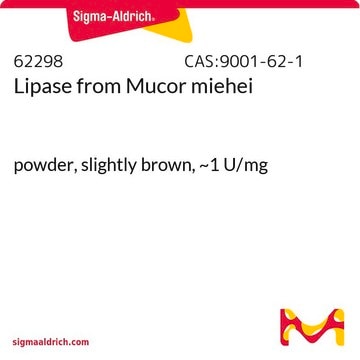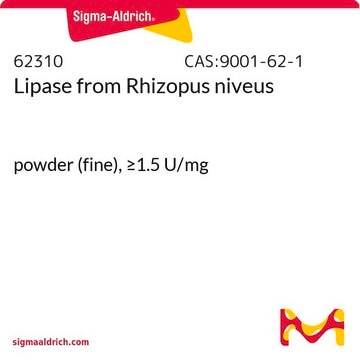62285
Lipase from Aspergillus oryzae
lyophilized, powder, white, ~50 U/mg
Sign Into View Organizational & Contract Pricing
All Photos(1)
About This Item
Recommended Products
form
powder
Quality Level
quality
lyophilized
specific activity
~50 U/mg
color
white
storage temp.
2-8°C
InChI
1S/C11H9N3O2.Na/c15-8-4-5-9(10(16)7-8)13-14-11-3-1-2-6-12-11;/h1-7,16H,(H,12,14);/q;+1/b13-9-;
InChI key
QWZUIMCIEOCSJF-CHHCPSLASA-N
Looking for similar products? Visit Product Comparison Guide
Related Categories
General description
Lipase is a carboxylesterase, which belongs to the α/β hydrolase fold family. It consists of a lid domain, hinge domain, and a catalytic triad Ser-His-Asp/Glu. Aspergillus oryzae lipase has a three-dimensional structure is an α/β hydrolase fold similar to that of the esterase enzyme.
Application
Lipase from Aspergillus oryzae has been used as a component of mixed enzyme solution to determine the viable cell numbers in the biofilms formed by Listeria monocytogenes strains.
Biochem/physiol Actions
Lipases are used industrially for the resolution of chiral compounds and the transesterification production of biodiesel.
Lipases catalyze the hydrolysis of triacylglycerols into glycerol and free fatty acids. Aspergillus oryzae lipase might be used in the production of biodiesel from waste cooking oil. It is used in the acetylation of cellulose and ochratoxin A degradation, and asymmetric organic synthesis. Lipase from Aspergillus oryzae is an industrial enzyme that has various uses in food, detergent, and pharmaceutical industries. It is useful in immobilization studies for 1,3-dioleoyl-2-palmitoylglycerol (OPO) synthesis.
Unit Definition
1 U corresponds to the amount of enzyme which liberates 1 μmol oleic acid per minute at pH 8.0 and 40°C (triolein, Cat. No. 62314 as substrate)
signalword
Danger
hcodes
pcodes
Hazard Classifications
Resp. Sens. 1
wgk_germany
WGK 1
flash_point_f
Not applicable
flash_point_c
Not applicable
ppe
Eyeshields, Gloves, type N95 (US)
Certificates of Analysis (COA)
Search for Certificates of Analysis (COA) by entering the products Lot/Batch Number. Lot and Batch Numbers can be found on a product’s label following the words ‘Lot’ or ‘Batch’.
Already Own This Product?
Find documentation for the products that you have recently purchased in the Document Library.
Customers Also Viewed
Lipases: from production to applications
Melani N, et al.
Separation & Purification Reviews, 49(2), 143-158 (2020)
Youwen Pan et al.
Applied and environmental microbiology, 76(5), 1433-1441 (2010-01-06)
Biofilm formation by Listeria monocytogenes is generally associated with its persistence in the food-processing environment. Serotype 1/2a strains make up more than 50% of the total isolates recovered from food and the environment, while serotype 4b strains are most often
Haiying Cai et al.
PloS one, 10(7), e0133857-e0133857 (2015-07-29)
The enzymatic synthesis of 1,3-dioleoyl-2-palmitoylglycerol (OPO), one of the main components of human milk fats, has been hindered by the relatively high cost of sn-1,3-specific lipases and the deficiency in biocatalyst stability. The sn-1,3-specific lipase from Aspergillus oryzae (AOL) is
Hedwig Strohalm et al.
Journal of agricultural and food chemistry, 58(10), 6328-6333 (2010-04-27)
The preparation of ester enantiomers (acetates, butanoates, hexanoates and octanoates) of the secondary alcohols 2-pentanol, 2-heptanol and 2-nonanol via lipase-catalyzed kinetic resolutions was investigated. Conversion rates and stereochemical courses of esterification and hydrolysis reactions catalyzed by commercially available enzyme preparations
Guan-Chun Chen et al.
Biotechnology letters, 33(3), 525-529 (2010-11-04)
Triacylglycerol lipase from Pseudomonas cepacia and Fe(3)O(4) magnetic nanoparticles were encapsulated simultaneously within biomimetic silica through the catalysis of polyallylamine. The encapsulation efficiency reached 96% with an activity recovery of 51%. After 5 h at 37°C, the activities of the
Our team of scientists has experience in all areas of research including Life Science, Material Science, Chemical Synthesis, Chromatography, Analytical and many others.
Contact Technical Service